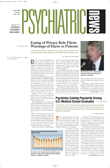New data show that drinking alcohol to excess, long a common extracurricular activity on college campuses, is more dangerous than anyone had realized (
see story).
In efforts to stem risky behavior related to excessive drinking, the Panel on Prevention and Treatment of the National Institute on Alcohol Abuse and Alcoholism’s Task Force on College Drinking sent a list of recommendations to more than 3,600 college and university presidents across the nation. The recommendations are compiled in the report, “How to Reduce High-Risk College Drinking: Use Proven Strategies, Fill Research Gaps.”
Not surprisingly, the report recommends that college and university administrators restrict the availability of alcohol on campus, enforce the age minimum on drinking, and communicate alcohol policies to students and parents before and after students arrive on campus.
The panel also suggested that students participate in cognitive-behavioral skills training, which has been found to lead to healthier attitudes toward drinking. The training seeks to modify students’ beliefs or behaviors associated with high-risk alcohol consumption, helps students to understand they have the right to abstain from drinking, and reinforces that it is normal to be upset over the harm caused by other students’ excessive drinking.
Brief motivational interventions have also been found to lower the incidence of high-risk drinking, according to the report. In this type of intervention, students are given a questionnaire to complete regarding their drinking habits. Students then receive nonjudgmental feedback on their drinking behavior and the negative consequences that result from drinking.
“Social norms” interventions have also been shown to reduce problem drinking in college students. Research shows that peers have the greatest influence on student norms, and in this kind of intervention, campus administrators can make that fact work to advantage. Most students believe their peers hold more permissive attitudes about drinking and drink more heavily than they actually do, according to numerous studies. To address these misconceptions, administrators can publicize data about actual drinking norms among college students on radio programs or in college newspapers.
Educational interventions used alone or with these interventions can provide students with information about alcohol-related programs and policies on campus, drinking-and-driving laws, and how students can recognize the signs of alcohol poisoning in a peer and what to do when this happens.
The report, “How to Reduce High-Risk College Drinking” can be accessed on the Web at www.collegedrinkingprevention.gov/Reports/Panel02/Panel02_TOC.aspx.
